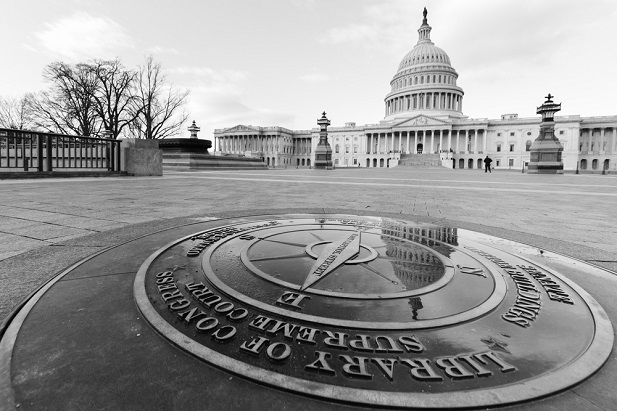 Sponsors that have closed pension plans to new participants, but continue to fund them for existing participants, may be forced to freeze plans absent the SECURE Act's relief for non-discrimination rules. (Photo: Shutterstock)
Sponsors that have closed pension plans to new participants, but continue to fund them for existing participants, may be forced to freeze plans absent the SECURE Act's relief for non-discrimination rules. (Photo: Shutterstock)
As Democrats in the House of Representatives explore bringing formal articles of impeachment against President Trump, the fate of critical retirement bills hangs in the balance.
Some reports have House Democrats looking to bring formal articles against the President by Thanksgiving. The question is whether that potential could crowd out the legislative energy needed to move the Setting Every Community Up for Enhancement (SECURE) Act and other retirement bills through the Senate.
"Impeachment would only very indirectly affect the retirement bills," said Alan Glickstein, managing director, retirement, at Willis Towers Watson.
"On the one hand it does limit bandwidth," he said. "But on the other hand lawmakers always have a lot going on. There is interest on the part of all lawmakers to point to their accomplishments."
For some defined benefit plans, and hundreds of thousands of participants, time is of the essence.
One provision of the SECURE Act would update existing IRS non-discrimination plan testing rules, which are designed to assure that plan sponsors are distributing retirement benefits equitably across pay scales.
Sponsors that have closed pension plans to new participants, but continue to fund plans to support the benefits of existing participants, may be forced to freeze plans absent the SECURE's relief for non-discrimination rules.
"When plans are closed for a period of time, the mathematics of the tests move in an unfavorable direction and they become harder to pass even though there is nothing discriminatory in the funding," explained Glickstein. "If you fail the non-discrimination test you have a non-qualified plan that has to be frozen."
Natural demographic progressions—participants age and earn more money, and some leave the company sponsoring the plan—can lead to a failure to pass the testing, even though the plans passed the non-discrimination testing at the time they closed.
Last week, Sen. Rob Portman, R-OH, addressed the issue during a larger floor speech on the SECURE Act and other retirement bills.
"The problem is that inadvertently, the rules with regard to pensions are tripping these people up," said Portman, who noted that more than 450,000 pensioners in the private sector stand to see their plans stop accruing benefits.
"It is an older group of employees, and, therefore, more highly compensated because they've been given raises over time. So they trigger this nondiscrimination income testing and they lose their benefits," explained Portman. "That's just wrong."
The Retirement Security Preservation Act updates the IRS's testing rule. It is part of the SECURE Act, but has also been separately introduced in the Senate by Portman and Sen. Ben Cardin, D-MD.
The SECURE Act overwhelmingly passed out of the House in May, but several holds on the bill have stalled it in the Senate.
The IRS has issued temporary testing relief, said Glickstein, but it doesn't suffice for some pensions.
"In our client base, there are hundreds of thousands of participants that will be affected," he said. "The concept behind the provision is simple, and not at all controversial: If you fully met all of the non-discrimination requirements on the day you closed the plan, there is no policy reason why that shouldn't be good enough."
A failure to pass the Retirement Security Preservation Act, either as standalone legislation or as part of the SECURE Act, will have "real life" affects, said Glickstein.
"It will hurt people and generally be irreversible," he added.
For some plans, the relief is already too late, and the decision to freeze plans—which sponsors and their boards of directors can take years to make—has already been made. The decision is often based on how close plans are to passing the non-discrimination tests.
"Every plan is in a different spot," said Glickstein. "For some, it will happen in 2020, or the year after, when they can't pass the test. Prudent plan sponsors that don't have clarity will have to freeze plans."
Portman called on the Senate to pass the Retirement Security Preservation Act on its own and said he has found no objections to the bill on either side of the aisle.
"If we don't fix it, then by this year end, like in the next couple months here, these people are going to lose their benefits. So my hope is that now that we have tested the waters and found out that it's not controversial among my colleagues, let's just bring it up under unanimous consent, get it done, and then let's move on and do the SECURE Act, too," said Portman.
Glickstein does not prefer the bill be carved out of the SECURE Act. Attempts to have the SECURE Act attached to temporary spending bills in September failed. The next opportunity will come in November, when lawmakers will have to finalize spending bills for next year.
"There's a good chance it gets done by the end of the year, and a good chance it doesn't," he said. "I'm most concerned the clock will run out on us again. We haven't had comprehensive retirement legislation in a long time. It would be good for Congress to carve out time to focus on retirement issues."
READ MORE:
© 2025 ALM Global, LLC, All Rights Reserved. Request academic re-use from www.copyright.com. All other uses, submit a request to [email protected]. For more information visit Asset & Logo Licensing.








